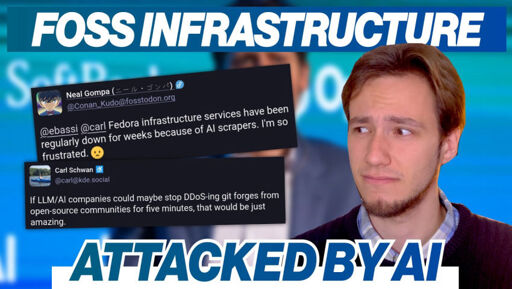Some weird, German communist, hello. He/him pronouns and all that. Obsessed with philosophy and history, secondarily obsessed with video games as a cultural medium. Also somewhat able to program.
- 23 Posts
- 32 Comments

 29·22 days ago
29·22 days agoWhy was the US funding FOSS projects? That strikes me as weird, inappropriate and suspicious.
A mixture of the elements within the US that actually believed the stuff about personal rights and democracy still existing behind the more sinister realities, as well as it being in the same pot of funded projects like Radio Free Asia, Radio Liberty and the likes, which always were a mix of just outright propaganda organs, but also providing the scaffolding of free media access for some regions in the past.
So, it’s complicated, ultimately rooted in a mix of the cynical US wanting to support dissidents in other countries, and the idealist US also having people actually believing in personal freedom and privacy, even within their government/state structures.
Also, just in general, a lot of FOSS projects get funding from governments, US or otherwise. If I remember correctly ReactOS got a lot of funding from Russia, for example, because they saw a potential way to get away from Microsoft in it.
From what I gather, there was no open influence wielded over those projects, I at least don’t remember the OTF forcing a backdoor onto Tor Browser for the CIA or something like that - thankfully the open source structure makes that easier to control - but the weakness becomes apparent now, of course, because funds could now be withdrawn, as the government turned fascist.

 4·22 days ago
4·22 days agoKind of, I wouldn’t really call them an international organisation in the way I would be imagining, see how easy it was to cut their funding when national interests turned openly fascist. Their affiliation with the US government above more independent, international organisations meant, that they would support privacy and a free and open internet, as long as it helps dissidents in other, non-aligned countries, but quick to cut it, if it reaches their own doorsteps.

 23·22 days ago
23·22 days agoNot the one you answered to, but I think I can understand the idea of US funding having been a toxic source of dependency, and it being better in the long run to get money elsewhere. That “elsewhere” is a good question, though.
Just me, personally, my dream would be an international fund, carried by the UN or maybe an independent NGO, that can get funding from both private and public funds, that prioritises free internet access the way the WHO prioritises health. But I think that’s still far off.

 4·26 days ago
4·26 days agoThat is one really clever idea, that I would love to try out if I had a 3D-Printer! Of course, there is the question of how obnoxious this can get for people around you… (still worth it, even if only to fidget with while alone)

 1·27 days ago
1·27 days agoJust anecdotally speaking (last time I used mint was many years ago), I used to have problems on there from outdated (GPU) drivers and/or an outdated kernel often when playing games back then, but I don’t know what developments happened since then. Back then, problems vanished for me when I changed to Manjaro.
If this persists and no obvious issue can be found, looking into how to upgrade your AMD/NVIDIA drivers or overall kernel beyond the standard ones shipping with stable mint may help in the end (maybe there’s a memory leak somewhere in an interaction with an older version?) - or switching to a different Distro, as frustrating as this may end up being. (If gaming is a major activity you plan on, Garuda or Bazzite are the current recommendations)
But treat this one as it is: basically a blind guess based on anecdotes from many years ago. Fingers crossed you’ll have it sorted out.

 1·27 days ago
1·27 days agoTo anyone here interested in more things adventure and narrative gaming: [email protected]

 3·27 days ago
3·27 days agoI get it, especially for users that have always been more on the lurking side (and this isn’t judging, that has always been the majority for any platform) - it can be a bit empty. As someone who has been here since 4 years ago (now I’m on a new account on my own instance), the first two years of that basically just visiting every few months out of curiosity, I can slowly see more diverse communities popping up recently, beyond the established strong points of Lemmy (FOSS, Politics, LGBTQ+ memes). And this time, unlike the first Reddit exodus, I have more confidence in them not immediately dying from lack of conviction and activity.
But of course, the sheer gargantuan user count of Reddit comes with many advantages. For many obscure topics, there will still be enough people, that a sufficient amount of “super users” congregate to provide content and moderation, so that lurkers can usually participate and still post sporadically. The latter is of course also a giant advantage, millions of people posting occasionally still provide lots and lots of posts and comments. And of course, it will take a long time and more fuckups for Reddit not simply being “the default” if you want to create a forum for a community around something. (Also, waaay too much of our knowledge is on that platform, we carelessly gave answers to help fellow humans, and now the answers are on Reddit for them to appear in countless internet searches, and for them to do with as they please.)
Where Lemmy currently has its strong suits is enthusiasm of parts of the user base, fewer issues getting noticed at all among the millions of (bot/re)-posts, and where there is activity, I’ve usually seen it panning out being able to handle actual discussions. (Though, lets not kid ourselves, of course the Reddit-like structure also still encourages circle jerks. I don’t even think that is that large of a problem, but it’s a reality.)
If you feel you end up having the energy to keep a community alive through dry spell, sure, be the change you seek, but it’s okay and understandable if you don’t want to invest the energy and work (at the moment). In that case, just stay tuned, check out the communities that pop up in all/scaled or all/new for interesting ones currently getting more traction, the Threadiverse will take a long time before it can replace a giant like reddit, but it has a few good stones for its sling up its sleeve.

 216·1 month ago
216·1 month agoSounds like an easy way to do unproportional damage to projects with a bit of location spoofing.

 8·1 month ago
8·1 month agoI think that is utlimately valid - although I think the other options are all coming with their own problems. You will then have to instead live with the interests of tech corporations (including nonprofits who ultimately need funding) and advertisers collecting your data, whose interests will ultimately not be much less malignant - or small free software projects of a sometimes quite limited scope. The latter, I think, is also a valid niché, but will leave the overall standards of the internet to corporate interests.
Considering how the CEO here acts for Brave, in my opinion, this is not simply about him being an asshole or being politically questionable. To me - everything about him screams “grifter taking advantage of people’s legitimate concerns” - and he has a material interest in your data as well. Brave always felt to me like trying to sell and market privacy instead of proving to me, in their fundamentals, that they actually have my interests in mind.
Which is why I, personally, do not really understand choosing Brave above LibreWolf (or Tor Browse, occasionally), if privacy is your #1 priority.

 2·1 month ago
2·1 month agoOh, yes, it wasn’t a direct answer, also, I’m not the person you answered to. Ultimately, my comment was more meant as an overall addition to the discussion, building on the idea of what a solution to:
Which I think is one of the big issues with OSS projects - many are based around a very small number of people being motivated to work on something for free. And it dies if that stops.
might be.
But as answers to your two points. #1 - I have no idea where they got that from, myself #2 - I think you answered that one yourself rather well, and I wanted to build on that one.
Sorry if that was confusing, my brain is also good at confusing myself at times, can’t imagine how that is for others at times.

 41·1 month ago
41·1 month agoI can somewhat understand the overall criticism, because Librewolf - as far as my understanding goes - would be in trouble without the work being done on the code upstream.
Personally, I know that this does not exist (yet), and to some people that put privacy above everything else with a more libertarian slant, this might sound like the worst option imaginable, but my “dream” way to handle it within the current economic system would be:
Have an open source, FOSS base, web-engine and all, developed with public funds similar to public broadcasting in many countries (Bonus if carried by international organisations instead of just national. Think a UN institution like UNESCO or WHO, but focused on making the internet accessible neutrally and to all). On top of that code, projects that want to put privacy above all else could still feasibly built projects like LibreWolf (an even Brave), relying somewhat comfortably on secure fundamentals.
I know, sounds like a dream, which it is at this point. But every other solution within the current economic status quo I personally thin of, I see no chance of enshittification not always encroaching and creating crises, if not outright taking over.

 20·1 month ago
20·1 month agoOh, just to not accidentally create the wrong impression - that’s not me, I just shared the video and didn’t want to editorialise the title. If you want to give them your message (that I think is important, indeed) - you can follow the link and should be able to comment with many different activitypub account options (PeerTube itself, Mastodon, etc.) - sadly, I don’t think Lemmy is possible yet, because its design isn’t user-centric but content-centric, and it lacks some of those AP-capabilities.

 3·1 month ago
3·1 month agoAh, that makes the context more understandable. Also, good job on providing that service, I think it’s actually great to have that in the ecosystem.
I do not put any limits on the database and even my lowest capacity plans have a very generous soft-limit 100GB media storage.
Actually, wow, yeah, having a quick look at your site, that is a very good and competitive offer for these prices and services provided, all things considered.

 3·1 month ago
3·1 month agoYeah, I personally wouldn’t choose them, but I think they do fill a niche for non-techie users, who will gladly pay a (sometimes hefty) premium for having less hassle on the setup and maintenance sides, when compared to getting A VPS or dedicated server somewhere (or setting smth up at home).
Their videos are also usually pretty informative, including e.g. the one about managing mastodon storage - since it’s topical here.

 11·1 month ago
11·1 month agoAh, yeah, I keep being scatterbrained and impulsive when crossposting, and forgetting he sadly doesn’t even link direct links in the video description, instead of just to the website itself. Will add the link to the lemmy post bodies at least.

 19·1 month ago
19·1 month agoWow, you’re right of course. I completely forgot kwrite still existed, tbh.

 12·1 month ago
12·1 month agoNot sure what this is about
If I were to give them the biggest empathy I can muster, they may just remove it as silently as possible out of fear of having to moderate the comments of bound-to-be popular post according to reddit’s increasingly stupid rules of discourse.
Still unjustified censorship, very worrysome - but I could on an emotional level understand being fed up with everything at this point and just powertripping because “fuck everything, I don’t want to deal with anything like this, I am not getting paid enough/at all”.

 781·1 month ago
781·1 month agoI genuinely do a lot of coding in Kate, the standard KDE editor. It’s enough to do a lot of things, has highlighting, and is more than enough when you just need a quick fix.
I am also still using nano when editing stuff in the terminal. Please, don’t judge me.

 121·1 month ago
121·1 month agoI wouldn’t be surprised if that is true outside the US as well. People that actually (have to) work with the stuff usually quickly learn, that its only good at a few things, but if you just hear about it in the (pop-, non-techie-)media (including YT and such), you might be deceived into thinking Skynet is just a few years away.




















¬(Yes; libreddit is more than a read-only frontend for Reddit)